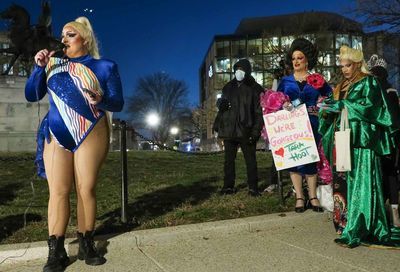Have Faith
Commentary: Center Field
Boston’s St. Anthony Shrine is not your typical Catholic experience. Scott Pomfret, a gay porn writer and SEC attorney who is a lay lector there, writes of when a blue-haired lady approached a Franciscan friar before Mass and pointed to the announcement for the Gay and Lesbian Spirituality Group in the weekly bulletin. She asked angrily, ”What’s next? You going to have a support group for prostitutes?” The friar replied, ”Why? Did you want to join?”
Since My Last Confession is Pomfret’s witty and probing account of his struggle with his faith in the context of the same-sex marriage fight in Massachusetts. He attempts to confront Cardinal Seán O’Malley over anti-gay dogma that includes a declaration that Rome’s opposition to adoptions by gay couples cannot be disputed.
Along the way he encounters the organization Roman Catholic Womanpriests; O’Malley’s motto, ”Quodcumque Dixerit Facite” (Do Whatever He Tells You); the macabre reverence within the Church for relics of the saints; and a politically correct Dignity service in an Episcopal church basement. ”Before approaching the sacred sawhorse for our consecrated pitas,” Pomfret writes of the service, ”the Marist reminded us that there was a gluten-free ‘host alternative’ as well as consecrated grape juice for those with ‘special needs.”’
Pomfret provides sidebars explaining everything from Catholic vocabulary to clerical garb to excommunication to Butler’s Lives of the Saints. He also lists clues as to whether Cardinal O’Malley is or is not gay (he calls it a draw), and gives a short history refuting the claim by the Massachusetts Catholic Conference that marriage has remained unchanged for millennia as a union between one man and one woman.
Mentioning that he and his partner commit what the 1878 Baltimore Catechism calls one of ”the Four Sins that cry out to Heaven for vengeance,” Pomfret notes that putting consensual sodomy on a par with willful murder is ”a tad extreme.” He points out that the Vatican’s chief exorcist in 2002 called the Harry Potter books ”satanic,” and observes dryly, ”Nice to know the Vatican was holding high-level consultations about protecting children from fictional characters while subjecting the same children to predatory priests.” Irreverence here is not just a way of dealing with pain, but a tool for eliciting the truth.
The book is filled with vivid observations, as when describing a spirituality group member whose ”legs trailed away from his upper body like a nasturtium spilling over an iron railing.” Pomfret can be unexpectedly moving: ”An old woman in the second row skipped a whole decade of her rosary, raised her face to the altar, and revealed that she had once been very beautiful.”
The testimony by some Jesuit priests against the proposed Massachusetts marriage amendment prompts Pomfret to recall a story about Jesuit missionaries: ”So much did the Mohawk warriors admire the priests’ bravery that they cut out the Jesuits’ hearts and ate them so as to inherit the Jesuits’ courage.” Much of the book deals with his search for dissenters of similar courage.
He learns to get past his anger and value earlier contributors to the struggle, like the founders of Dignity/Boston in the 1970s. Epiphanies emerge in simple events around him, including a moment during an infant niece’s baptism that reminds him why he’s Catholic. In another incident, his atheist boyfriend drafts marketing materials for the boyfriend’s brother and his wife, a devout couple seeking spare eggs from other couples’ in vitro fertilizations, and coins the tagline, ”Give us your leftover miracles.” This act of grace by a nonbeliever paradoxically buttresses Pomfret’s own faith.
Reminding himself that his ministry ”is not about me,” he finds wisdom among his fellow worshippers. A lesbian named Angela says of her parish in San Francisco’s Castro neighborhood, ”It was the first place I could ever go into and worship with all my parts.” A gay father of three explains why he is still Catholic: ”It’s a Rosa Parks thing. I’m just not moving. It’s my Church, too, as much as theirs.” Pomfret discovers a network of believers challenging the larger Church to replace its framework of static orthodoxy with one of living and discovering.
Pomfret realizes that Rome is too preoccupied with control issues to consider the value of dissent and doubt in the journey toward wisdom; yet many of its gay communicants abide. ”Brokenness,” Pomfret affirms, ”is an opportunity for the Spirit to enter.”
Richard J. Rosendall is a writer and activist whose work has appeared on Salon.com and the Independent Gay Forum (www.indegayforum.org). He can be reached at rrosendall@starpower.net.
Support Metro Weekly’s Journalism
These are challenging times for news organizations. And yet it’s crucial we stay active and provide vital resources and information to both our local readers and the world. So won’t you please take a moment and consider supporting Metro Weekly with a membership? For as little as $5 a month, you can help ensure Metro Weekly magazine and MetroWeekly.com remain free, viable resources as we provide the best, most diverse, culturally-resonant LGBTQ coverage in both the D.C. region and around the world. Memberships come with exclusive perks and discounts, your own personal digital delivery of each week’s magazine (and an archive), access to our Member's Lounge when it launches this fall, and exclusive members-only items like Metro Weekly Membership Mugs and Tote Bags! Check out all our membership levels here and please join us today!



















